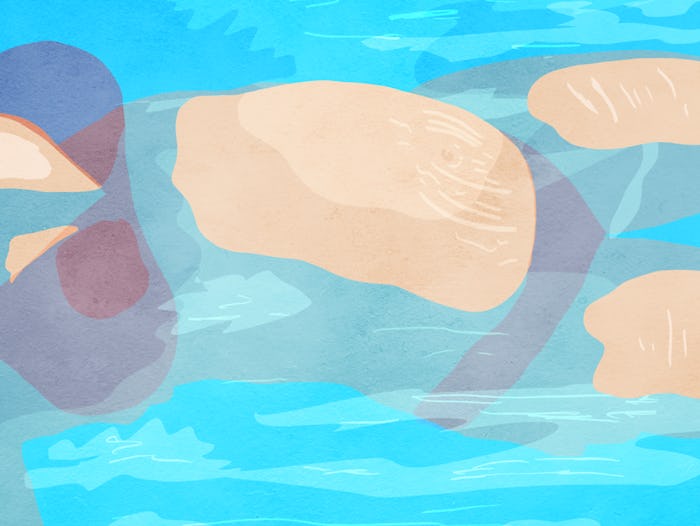Life

6 Reasons Struggling With Your Postpartum Body Doesn't Make You A Bad Feminist
The weeks and months (and possibly years, if you're me) following the birth of your baby can be challenging and confusing when it comes to body image. We're given such mixed messages, aren't we? Be proud of your body after having a baby, and what it's created! Love yourself and all your tiger stripes! But also? Look at all the celebrities who look even better than they did before getting pregnant, a mere six weeks postpartum! It's enough to drive a new mom crazy.
About three months after having my second child, I was out somewhere with an acquaintance who didn't have kids of her own. She complimented me on how flat my stomach was already, and I felt like I wanted to throttle her. I'm sure she meant nothing negative by it, and was only trying to find a way to relate to me on a subject that she was clearly inexperienced with, but it got my feminist hackles up. Why should I care about my stomach shrinking back to its original size, and why do other people feel the need to comment on it?
Of course, as I fell into postpartum depression and began to do some serious emotional eating, my self-esteem and body image ended up taking center stage after all. I briefly fit into my pre-pregnancy clothes, then gaining a lot of my pregnancy weight back and hating myself for it. And eating more to cope with that self-loathing. It was...a whole thing. And on top of all the other unpleasant feelings I was straddling around that time, there came the feminist self-doubt: As a feminist, am I not supposed to be way beyond getting this hung up on how my body looks?
The thing is, even when we want to love and appreciate our bodies, after having a baby, it can be really hard to shift our way of thinking. But that doesn't mean we aren't feminists. And it doesn't mean we're not going to teach our children to love and respect their own bodies.
Being A Feminist Doesn't Mean You Have To Love Everything About Your Body
Body image is a complex thing, and regardless of how hard we try not to let external sources affect how we feel about ourselves, the massive changes that your body goes through during and after pregnancy can wreak havoc on your sense of self.
We Are All Works In Progress
I am currently the heaviest I've ever been at any time when I wasn't growing a baby inside me. I see plenty of stunning women who are bigger than I am, and would be happy to look like them, but I'm unhappy with how I look. I'm trying to love myself, though, and I truly believe that the trying is what's important right now.
Our Identities Are Intrinsically Connected With Our Body Image
Listen, whether you like it or not, whether you feel empowered by your body or not, who we are as women is made up of multiple facets, including how we feel about our bodies. When your body changes, you need to take time to figure out how to handle it.
But In The End, My Body Does Not Define Me
It's a fairly fundamental feminist belief that we should not let our bodies define who we are as people. How we feel about our bodies at any given time should be included in that, because obviously these feelings change over time, and vary depending on what we're going through.
Having A Baby Is A Huge Life Change, And Being A Feminist Doesn't Mean I'm Unflappable When My Life (And Body) Are Turned Upside Down
Listen, this is a monumental change I've just been through, and struggling with my postpartum body isn't about body-shaming myself. The struggle has more to do with regaining my equilibrium after all those changes, and that's not always a smooth and easy process.
My Body Was Just Put Through A LOT, All For The Sake Of Having A Baby
The fact that I'm uncomfortable with the effects on my body is partially because I'm a feminist, and it's hard for me to reconcile the fact that all of this happened for my body to serve a function tied to conventional and oppressive notions of motherhood. And actually, I'm pretty sure my feminism is making it harder for me to deal with my postpartum body. So there's that. There's a lot to process and accept and catch up with when — while you were busy preparing for some new person's arrival and their life — suddenly your entire body is different. It means a hell of a lot more than adhering or not adhering to social body ideals, and it doesn't mean anything about the state of my feminist identity.